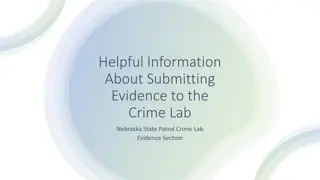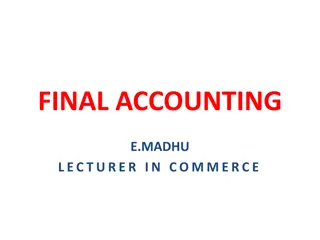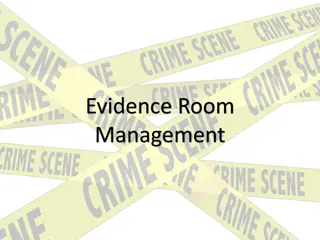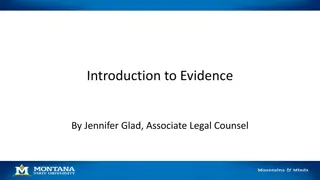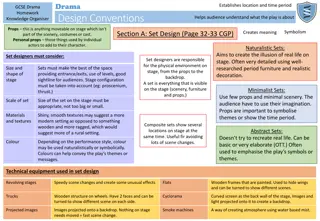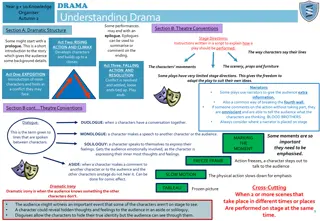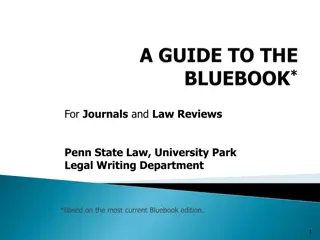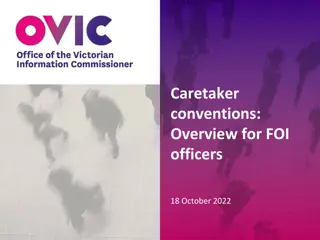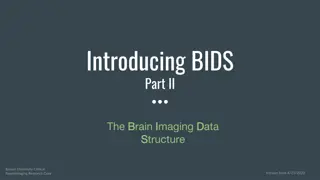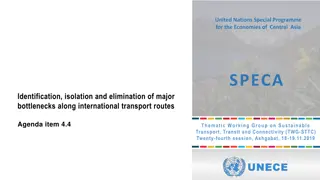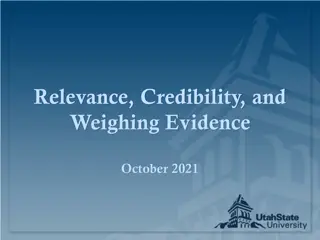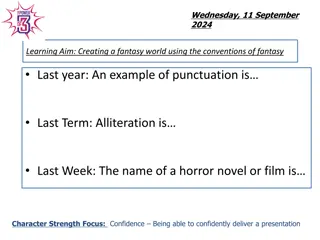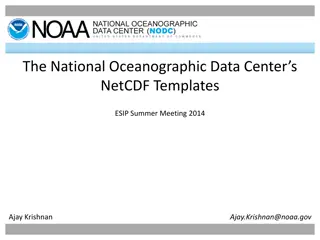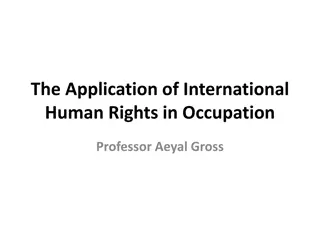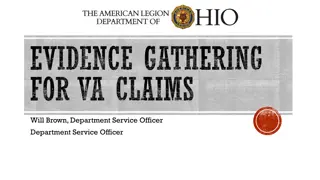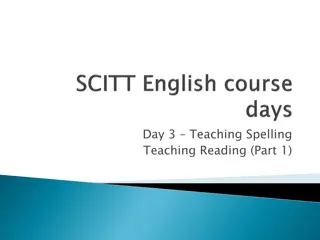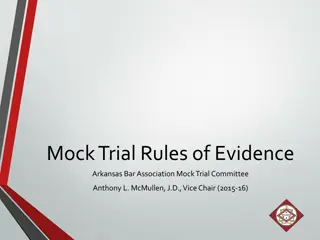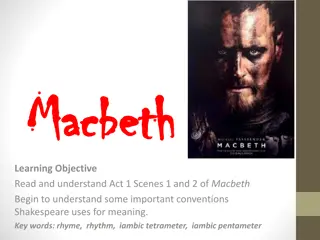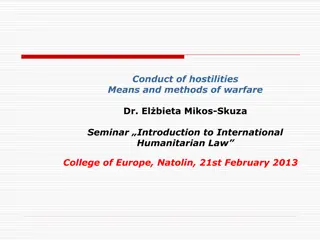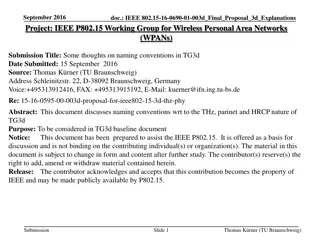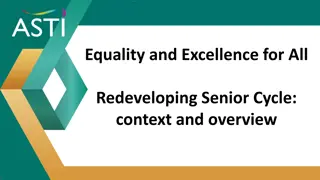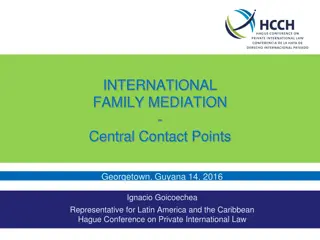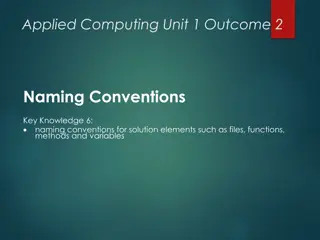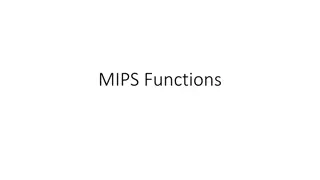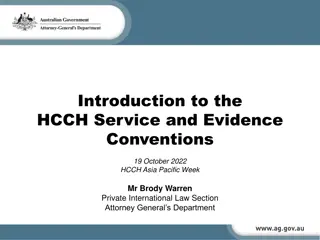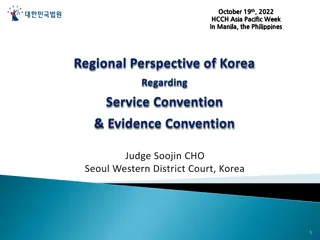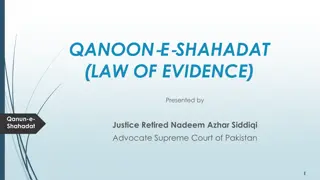The Role of Artifacts and Evidence in Educator Evaluation and Support
Exploring the role of artifacts and evidence in educator evaluation, this content covers the three categories of evidence required by the Oregon Framework. It delves into the efficient process that reduces redundancy, essential components of SLG goals, and the types of evidence relevant to professio
0 views • 15 slides
Understanding Impression Evidence Collection in CSI Investigations
Impression evidence plays a crucial role in investigations, including shoeprints, tool marks, tire tracks, bite marks, and riffling marks on bullets. This evidence can be collected in 2D using photography or tape lifts, and in 3D through casting methods. Differentiating between class and individual
0 views • 21 slides
Helpful Information About Submitting Evidence to the Crime Lab.
Helpful information about submitting evidence to the Nebraska State Patrol Crime Lab's Evidence Section. Learn about the NSP 750 Evidence Submittal Form, submission process, and guidelines for resubmissions. Ensure all necessary details are provided for proper analysis of evidence.
5 views • 16 slides
Illegally obtained evidence
Illegally obtained evidence refers to evidence acquired through unlawful means, such as searches without warrants or extraction under duress. The Fruit of the Poisonous Tree doctrine renders evidence inadmissible if derived from illegally obtained evidence. The Exclusionary Rule prohibits the use of
2 views • 30 slides
Fundamentals of Financial Accounting: Concepts, Conventions, and Cycle
Learn about the systematic process of financial accounting, including identification, recording, measuring, classifying, summarizing, analyzing, and interpreting financial information. Explore essential accounting concepts, conventions, the accounting cycle, rules, journal entries, and ledger manage
11 views • 29 slides
Evidence Room Management
Explore the intricacies of evidence room management in a law enforcement setting, including the roles of individuals like Greg Van Buskirk, differences in crime scene management between large and small departments, the distinction between property and evidence, the importance of maintaining chain of
0 views • 8 slides
Understanding Evidence in Investigations
Learn about the principles and types of evidence in investigations, including inculpatory and exculpatory evidence, physical, documentary, demonstrative, and verbal evidence. Explore sources of evidence and the significance of collecting relevant information to ensure a fair investigative process.
0 views • 14 slides
Drama Design Conventions in Set and Lighting for GCSE Drama Productions
This guide delves into the essential aspects of drama design conventions, focusing on establishing location and time period, utilizing props for symbolism, and creating immersive sets using naturalistic, minimalist, and abstract approaches. It also explores the crucial role of lighting in setting th
0 views • 5 slides
Theater Conventions and Characterization in Drama
Theater conventions such as prologues, epilogues, dialogues, monologues, and dramatic structure like exposition, rising action, climax, falling action, and resolution are explored in drama. Additionally, the importance of character creation through techniques like backstories, flashbacks, and flashf
0 views • 4 slides
Understanding Context Evidence in Legal Proceedings
Context evidence in legal proceedings refers to evidence of acts not charged in the indictment, used to provide a background for understanding specific allegations. This type of evidence is often relied upon by the prosecution to explain events or behaviors that may seem isolated or surprising. It i
1 views • 13 slides
Understanding Accounting Conventions and Principles
Accounting conventions are common practices adopted by accountants through general consensus, different from accounting concepts established by law. Key conventions include full disclosure, consistency, conservatism, and materiality, each guiding the disclosure and treatment of financial information
0 views • 6 slides
Bluebook Guide for Law Reviews and Journals at Penn State Law
The presentation provides a detailed overview of the Bluebook rules and formatting conventions for citing legal sources in law reviews and journals, specifically tailored for Penn State Law students. It covers proper citation forms, typeface conventions, and examples for main text and footnote citat
1 views • 105 slides
Understanding Caretaker Conventions in Government Ahead of Elections
Caretaker conventions are a set of practices followed by governments before elections to ensure fair governance transitions. These conventions aim to preserve the autonomy of incoming governments, prevent unfair advantages, and maintain political neutrality in the public sector. During the caretaker
0 views • 8 slides
Understanding Evidence-Based Medicine and Clinical Decision-Making
European Patients Academy on Therapeutic Innovation emphasizes the importance of Evidence-Based Medicine (EBM) in providing optimum clinical care. EBM involves systematic review and utilization of clinical research for informed decision-making, benefiting patients in disease management and treatment
7 views • 20 slides
Understanding BIDS File Naming Conventions
BIDS (Brain Imaging Data Structure) establishes standardized naming conventions for organizing neuroimaging data. It outlines rules for labeling subjects, sessions, tasks, runs, modalities, and exceptions. The structure helps maintain consistency and facilitates data sharing and collaboration in the
7 views • 11 slides
International Transport Route Facilitation Agreements and Conventions
Identification, isolation, and elimination of major bottlenecks along international transport routes are the focus of the United Nations Special Programme for the Economies of Central Asia (SPECA). Various conventions and agreements, such as the Convention on Harmonization of Frontier Controls of Go
0 views • 13 slides
Understanding Relevance, Credibility, and Weighing Evidence in Decision-Making
Explore the importance of relevance and credibility in evidence assessment, the role of hearing panels in evaluating evidence fairly, and the responsibilities they hold. Learn about presenting relevant evidence, policy analysis, and identifying irrelevant evidence to ensure a thorough review process
6 views • 32 slides
Mastering Claims, Evidence, and Warrants for Persuasive Writing
Understanding the concepts of claims, evidence, and warrants is crucial for constructing persuasive arguments. Claims represent positions to persuade, evidence supports claims with facts, and warrants bridge the gap between evidence and claims. An exercise is outlined to help practice forming claims
0 views • 8 slides
Understanding Biased Assimilation and Attitude Polarization in Social Disputes
People with strong opinions on complex social issues tend to interpret evidence in a biased manner, accepting confirming evidence readily while subjecting disconfirming evidence to critical evaluation. This can lead to increased polarization rather than narrowing of disagreement when exposed to the
0 views • 20 slides
Exploring Fantasy Worlds: Conventions, Types, and Challenges
Dive into the realm of fantasy literature and learn about the conventions, types, and differences between fantasy and sci-fi. Uncover the definition of fantasy, explore popular genres, and discover sub-genres like fiction, science fiction, and historical fiction. Engage in thought-provoking challeng
0 views • 17 slides
Transformation of Quality Assessment Framework in Healthcare
The healthcare quality assessment framework is evolving with a new strategy focused on data-led, people's experiences, care integration, and safety culture. The current framework is transitioning towards a new approach by late 2023, incorporating separate registration and monitoring processes, five
0 views • 14 slides
Building an International Child Protection System: The Hague 1996 Convention
The need for an international child protection system stems from the globalization and increasing situations where children require coordinated actions across national borders. Limitations in national systems prompt the call for international cooperation through tools like conventions and networks.
0 views • 14 slides
NODC NetCDF Templates for Oceanographic Data Management
Explore the integration of CF and ACDD conventions into the NODC NetCDF templates for organizing oceanographic data. Learn about the benefits, attribute conventions, CF feature types, and how to apply the conventions to your datasets effectively. Use the provided decision tree and examples to stream
0 views • 19 slides
International Human Rights in Occupation Law: Principles and Conventions
Explore the application of international human rights in the context of occupation law, examining key principles like territorial authority, restoration of public order, protection of individuals, and essential provisions for fulfilling obligations under international conventions.
0 views • 33 slides
Understanding Evidence Gathering for VA Claims with The American Legion Department of Ohio
Evidence is crucial for VA claims, and it can come in various forms such as documents, written statements, photos, and video recordings. The framework for evaluating evidence includes factors like relevance, competence, credibility, and weight. Understanding the types of evidence, forms of relevance
0 views • 14 slides
Exploring Effective Phonics Teaching and Spelling Conventions through History
Explore the development of effective phonics teaching and spelling conventions through reflective logs and historical context. Discover the impact of phonics sessions on understanding and teaching practices, delving into Old English to modern-day practices. Learn about the evolution of language and
0 views • 57 slides
Understanding Mock Trial Rules of Evidence
Mock Trial Rules of Evidence are crucial for determining the admissibility of testimony and evidence in a trial setting. Students preparing for cases need to assess evidence admissibility, make timely objections, and be prepared to defend testimony. The rules cover objections, specific objections ty
0 views • 36 slides
Understanding Shakespeare's Conventions in Macbeth Act 1 Scenes 1 and 2
Explore the importance of rhyme, rhythm, iambic tetrameter, and iambic pentameter in Act 1 Scenes 1 and 2 of Macbeth. Dive into the conventions Shakespeare uses for conveying meaning, including the use of rhyme in verse, rhyming couplets, and the significance of rhythm in the witches' opening scene.
0 views • 16 slides
International Agreements on Means and Methods of Warfare Throughout History
Explore the evolution of international agreements regulating means and methods of warfare from the 19th century to the present day, focusing on limitations imposed on belligerents to protect civilians and combatants. Various treaties and conventions such as the Hague Conventions, Geneva Conventions,
0 views • 23 slides
Naming Conventions in IEEE 802.15 TG3d Proposal
This document discusses naming conventions in the context of IEEE 802.15 TG3d, focusing on the THz PHY, pairnet concept, and HRCP applications. It distinguishes between TG3d and TG3e, highlighting commonalities and differences in device operations, frequency bands, and application scenarios.
0 views • 9 slides
Education Policy Evolution and Innovation at 2018 Convention in Cork
In 2018, Clayton Hotel Silver Springs in Cork hosted conventions focused on redeveloping the senior cycle, the interplay between international and domestic education policies, the role of global influencers and disruptors, challenges such as the climate crisis and the pandemic, and the evolving land
0 views • 16 slides
International Family Mediation and Hague Conventions Overview
International Family Mediation plays a crucial role in resolving cross-border family conflicts, such as custody disputes and child abduction cases, by promoting communication and sustainable solutions. The Hague Conventions provide legal frameworks for amicable solutions in international family law
0 views • 10 slides
Best Practices for Naming Conventions in Solution Development
Understand the importance of naming conventions for files, functions, methods, and variables. Learn how proper naming can enhance code readability, avoid potential errors, and ensure consistency across projects. Discover tips to create effective names that are easily understood, self-descriptive, an
0 views • 20 slides
Practice and Procedure in Judicial Review: Factual Evidence and Interveners
The content provides valuable insights into the practice and procedure regarding factual evidence and interveners in judicial review cases. It covers general rules, recent cases, applications for oral evidence, questioning witnesses, opinion evidence, and the role of interveners. Key points include
0 views • 28 slides
Understanding MIPS Functions and Calling Conventions
MIPS functions in assembly language are called using the 'jal' instruction, passing arguments in specific registers. Functions must end with 'jr $ra' and have explicit declarations. MIPS functions are stored separately from the main function in memory. The 'jal' instruction jumps to a specified addr
0 views • 18 slides
Enhancing Operational Efficiency and Collaboration in Project Management
This content provides insights into the changes happening in the online quotes release webinar organized by Brian Donlon and Olivier Perrigueur. It discusses aligning CRM and quoting tools, standardizing project naming conventions, and identifying primary influencers. Additionally, it explores the b
0 views • 12 slides
Overview of HCCH Service and Evidence Conventions
HCCH Service and Evidence Conventions aim to simplify international procedures for document service and evidence taking, overcoming legal system differences, enhancing judicial cooperation, and providing benefits through a global network, legal certainty, and the use of technology. The HCCH 1965 Ser
0 views • 23 slides
Regional Perspective of Korea on HCCH Asia Pacific Week
The regional perspective of Korea on the HCCH Asia Pacific Week held in Manila, the Philippines, is highlighted through Korea's involvement in the HCCH, including its membership dates and the number of cases under the Service and Evidence Conventions. Details on the processing period for these conve
0 views • 19 slides
Understanding Qanun-e-Shahadat: Law of Evidence in Pakistan
Qanun-e-Shahadat Order 1984 replaced the Evidence Act of 1872 in Pakistan, aiming to align the law of evidence with Islamic principles. This law is crucial for judicial proceedings, governing the admissibility of oral and documentary evidence, primary and secondary evidence, and resolving conflicts
0 views • 22 slides
Pointer and Reference Conventions in C++ Programming
Understanding the conventions for passing pointers and references in C++ is crucial for safe and effective programming. Different forms allow various levels of control, from read-only access to modification rights, each signaling a specific intent. These conventions help prevent unexpected behavior
0 views • 21 slides


